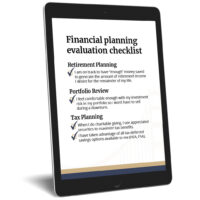
Signs that you need a new 401(k) plan advisor for your firm
Managing a 401(k) plan for your employees is a crucial responsibility. It can significantly impact your team’s financial future and your company’s ability to attract and retain top talent. A reliable and proactive 401(k) plan advisor plays a vital role in ensuring your retirement plan is effective, compliant, and aligned with both your company’s goals and employee needs.
How do you know when it’s time to make a change? Have you outgrown your advisor? Have you documented your fiduciary decisions? Are your employees on track for retirement? Do you spend too much or not enough time evaluating your 401(k) plan? Are plan costs too high? Are you meeting as fiduciaries at least annually and taking the right kind of minutes? Does your advisor proactively help you meet efficiently and improve the plan? Are your plan costs reasonable and transparent? That and more below.
13 indicators that a new 401(k) plan advisor may be a big help:
1. Lack of regular communication with fiduciaries
A strong relationship with your 401(k) advisor is built on clear and consistent communication. If your advisor isn’t providing updates, offering guidance, or proactively reaching out to ensure your plan is meeting its objectives, this is a red flag. An engaged advisor should meet with you regularly—at least annually—to meet Department of Labor/ERISA fiduciary requirements. first and foremost. They should also review:
- the appropriateness of the investment menu relative to your demographics and company philosophy,
- whether plan participants are utilizing the investment menu properly,
- if investment performance is reasonable vs. appropriate benchmarks, and
- plan design or investment menu adjustments.
You should also expect them to discuss the quality of plan provider support and answer any questions. If you feel like you’re always the one reaching out, it may be time to find someone more communicative and attentive.
2. Inconsistent or inadequate plan reviews and fiduciary meeting minutes
401(k) plans are not a “set it and forget it” kind of benefit. Your advisor should be reviewing your plan regularly to make sure it continues to meet the needs of both your company and your employees. This includes monitoring investment performance, ensuring the plan stays in compliance with regulatory changes, and helping you stay competitive with the benefits you offer. If your advisor isn’t conducting thorough, proactive reviews, it could lead to financial or legal issues down the line.
A good advisor will proactively inform you of any concerns so that you don’t have to wonder, and take action or provide recommendations, depending on the nature of the advisory agreement. A good advisor will also inform you regarding how to take fiduciary meeting minutes in a way that does not inadvertently create fiduciary liability.
3. Lack of fiduciary support
One of the most important roles of a 401(k) advisor is acting as a fiduciary—someone legally and ethically bound to put your interests and those of your employees first. If your advisor is not acting in a fiduciary capacity, or if you’re unsure whether they are, it’s a serious concern. Fiduciary responsibility includes using a prudent process, documenting key decisions/policy, ensuring the plan fees are transparent and reasonable (especially those charged to plan participants), ensuring the investments are appropriate, avoiding “fiduciary traps,” making sure conflicts of interests are systematically avoided, and more. If these things aren’t happening, it’s time to re-evaluate.
4. You don’t have or update an Investment Policy Statement
An Investment Policy Statement (IPS) is not a Department of Labor requirement, but the absence of an IPS is a red flag in a Department of Labor (DoL) Audit. When there is no IPS, or there is a stale or inappropriately written IPS, the DoL sees it as a sign of a lack of fiduciary process. They will dig deeper, which increases the time and cost burden of your company and increases the chance of correction letters and/or penalties. A well-written IPS will focus on policy, not the moving-parts of a plan’s implementation, and avoids language with which it is impossible to comply. A good IPS also acts as an educational and continuity document as members of your retirement plan committee rotate off and on. Note: if you don’t have a retirement plan committee, that’s another red flag!.
5. High fees with low transparency

A good advisor will ensure that your 401(k) plan operates with cost-efficiency, clearly explaining the fees associated with both managing the plan and the investment options available to your employees. If you:
- see high fees without receiving a clear explanation,
- feel the value you’re getting in return doesn’t justify the costs, or
- don’t have a fee-only engagement with the advisor,
these are signs that you may be over-paying and/or your advisor may not be a true fiduciary.
If you are not in a fee-only engagement, that is red flag for conflicts of interest and possibly hidden revenue that is your responsibility to uncover. When low transparency, trust diminishes; and, it may be a sign that it is time to switch advisors.
6. Poor employee education, decisions, and engagement
Employees rely on their 401(k) plan for their retirement, but they can’t make the most of it if they don’t understand:
- how the 401(k) plan works,
- the importance of gaining a sense of how much to save to achieve retirement readiness,
- maximizing their contributions,
- how to invest appropriately for each life stage, and
- what to do to avoid emotional investing mistakes.
A good advisor will offer educational sessions to ensure your employees are well-informed about this critical information. Participant education is not a fiduciary requirement, but it is a valuable component to improving retirement outcomes and morale, and keeping employees calm and focused when market volatility is high. If your current advisor isn’t actively helping your team understand their 401(k) plan and key concepts around saving and investing through education meetings and blogposts, they, and you, are missing an important opportunity to help your employees.
7. Failure to keep up with industry best practices and regulatory changes
The retirement plan landscape is always evolving with new rules, regulations, and trends. A qualified advisor will help you follow an appropriate fiduciary process, which is powerful for both best practices and as an “insurance policy” for your potential company and personal fiduciary liabilities. The advisor should also help ensure that you stay on top of key regulatory changes and requirements. By evaluating and/or helping you choose a skilled 401(k) record-keeping and third-party-administrator provider, a good advisor helps ensure your plan remains compliant with legal requirements, such as those set by the Department of Labor or the IRS. If your advisor and/or record keeper is not up-to-date on the latest industry regulations or doesn’t inform you of new opportunities or risks, this could expose your company to potential penalties and legal trouble.
8. Low-effectiveness investment menu design or bad performance for the wrong reasons
Your 401(k) plan should offer a range of high-quality investment options tailored to your employees’ diverse needs. This should include pre-built “off-the-shelf” or custom-built portfolio options (target date or target allocation) that are designed for the different life stages of your employees to make it easy for them to invest wisely. You want to avoid:
- only having asset class, rather than pre-built portfolio funds,
- expensive investments
- investments that are poorly diversified and missing key return-enhancer and/or volatility-reduction asset classes, or
- funds consistently underperforming their appropriate benchmarks.
If your advisor is not providing a “fiduciary dashboard” to document that due diligence assessments of the investments occurs regularly for the plan, it is a sign that your advisor is not using a best-practices approach. They may be more of a “set-it-and-forget-it” advisor that is more focused on “selling” new plans than providing appropriate expertise and service.
9. No customization for your company’s needs
Every company is different in culture, philosophy and employee demographics, and your 401(k) plan should reflect that. If your advisor is offering a one-size-fits-all approach without considering the unique needs of your business and workforce, this is often a problem. Your advisor should help you assess your company dynamics and tailor the plan design, investment menu strategy, and employee education approach based on the specific goals of your company and the demographic of your employees.
10. Your 401(k) plan fiduciary decisions take a lot of time or feel complicated
The stress, distraction and opportunity cost of long (or short but frustrating) internal retirement plan decision-making processes, regarding complicated decisions, research, plan provider evaluation and ongoing provider management, employee questions, and more is a sign that your advisor may not be providing you the support you need. A good advisor should make the process easier, smoother, and more efficient, while improving decision quality and documentation.
11. You’ve outgrown your advisor
Many plans understandably start small, with an advisor that is designed to provide very basic, high-volume service. This is sometimes the only way to start with an advisor. If they don’t have services for growing, larger plans with different needs, a growing employee base, complicated plan issues, or more customized designs, that may mean they served you well for a period of time, but that you’ve now outgrown them. It’s likely time to find a more advanced advisor that is designed to handle different and bigger needs.
12. No advisor at all?
Some plan sponsors think they have an advisor or fiduciary guidance when they don’t. For example, if you are working directly with a mutual fund company as your 401(k) provider, they are not legally able to act as fiduciaries. They are not an independent, third-party advisor that can help you ensure you are using an appropriate fiduciary process. Not having an advisor can significantly increase your fiduciary risk and costs.

There are a few mutual fund companies that provide low cost 401(k) solutions and may be relatively low-risk from a fiduciary standpoint, but they are not fiduciaries and cannot help you fulfill your fiduciary responsibility to assess the plan regularly with unbiased analysis.
You are falling short if you:
- don’t have the internal expertise to evaluate your plan independently
- are not meeting at least annually to do so, and/or
- don’t have a documented rationale for why you selected the 401(k) plan provider you are using, and/or
- don’t have documentation detailing why you selected your investment menu, how it is appropriate for your employees, and how you ensured there is sufficient diversification (and not a lack of diversification simply because the mutual fund company doesn’t offer certain types of funds/asset classes).
The Department of Labor requires that you have or outsource sufficient fiduciary expertise to evaluate and maintain your plan, and an appropriate outside advisor is often the best or only way to meet your fiduciary responsibility.
13. You are concerned about the cost of adding an advisor if you don’t have one
If you don’t have an advisor, it can feel like an unnecessary cost if “your plan is working fine.” If you aren’t hearing complaints, that can be a good sign… but not always.
First, review the items above to assess how well your plan is actually working—from both a fiduciary process standpoint and in terms of participant outcomes. Then, consider whether you’re achieving your goals as a leader; not just in managing company risks, but making a positive impact on your employees’ lives. Avoiding these type of costs may create other costs and liabilities, now or in the future, for the company or plan participants. Unfortunately, the Department of Labor doesn’t see cost avoidance as a valid reason to avoid fulfilling a fiduciary’s responsibilities.
Second, while the best advisory firms often have high minimum fees, some of those firms have scaled-down, simplified services for smaller or highly-cost-sensitive plans who are willing give up higher service levels and higher levels of customization for a lower fee. These more basic services are designed to help plans meet fiduciary responsibilities and reduce the need for plan sponsors to develop their own internal expertise, so they can focus on their businesses.
In many cases, the fee of a good advisor is a “negative cost.” This means that the advisor’s work helps reduce:
- other costs, such as plan providers or mutual fund fees, or
- the opportunity cost of time fiduciary spends on the plan rather than focusing on their business, or
- the chance of fiduciary/company penalties for lack of compliance.
Advisor can help add new value to fiduciaries and plan participants and improve the retirement readiness outcomes of plan participants.
Ready to improve your retirement plan?
If any of these warning signs and opportunities sound familiar, it’s worth considering a change. At The Advisory Group we focus on helping our retirement plan clients offer compliant, cost-effective plans and provide meaningful support to both you and your employees. A well-managed 401(k) plan can enhance employee satisfaction and loyalty while helping your company stay competitive. Take the time to ensure your current plan advisor is meeting the needs of your firm. For help evaluating your 401(k) plan or you want to set up a new employee retirement plan, don’t hesitate to reach out for a plan assessment or consultation. We’re happy to help.
The information provided herein is for informative and educational purposes only. The use of hyperlinks to third party websites is not an endorsement of the third party. Third party content has not been independently verified. To understand how this content may apply to you, please contact a financial advisor.






